The AMD Zen and Ryzen 7 Review: A Deep Dive on 1800X, 1700X and 1700
by Ian Cutress on March 2, 2017 9:00 AM ESTBenchmarking Performance: CPU System Tests
Our first set of tests is our general system tests. These set of tests are meant to emulate more about what people usually do on a system, like opening large files or processing small stacks of data. This is a bit different to our office testing, which uses more industry standard benchmarks, and a few of the benchmarks here are relatively new and different.
PDF Opening
First up is a self-penned test using a monstrous PDF we once received in advance of attending an event. While the PDF was only a single page, it had so many high-quality layers embedded it was taking north of 15 seconds to open and to gain control on the mid-range notebook I was using at the time. This put it as a great candidate for our 'let's open an obnoxious PDF' test. Here we use Adobe Reader DC, and disable all the update functionality within. The benchmark sets the screen to 1080p, opens the PDF to in fit-to-screen mode, and measures the time from sending the command to open the PDF until it is fully displayed and the user can take control of the software again. The test is repeated ten times, and the average time taken. Results are in milliseconds.
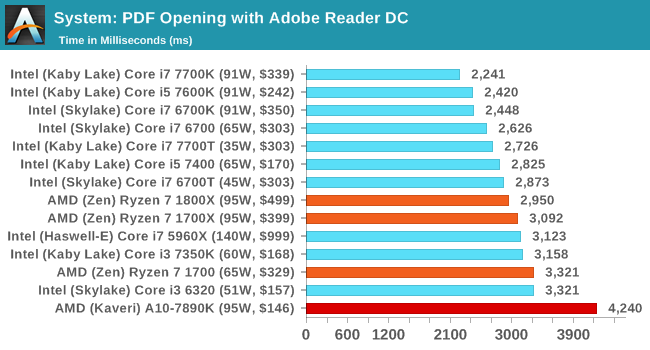
FCAT Processing
One of the more interesting workloads that has crossed our desks in recent quarters is FCAT - the tool we use to measure stuttering in gaming due to dropped or runt frames. The FCAT process requires enabling a color-based overlay onto a game, recording the gameplay, and then parsing the video file through the analysis software. The software is mostly single-threaded, however because the video is basically in a raw format, the file size is large and requires moving a lot of data around. For our test, we take a 90-second clip of the Rise of the Tomb Raider benchmark running on a GTX 980 Ti at 1440p, which comes in around 21 GB, and measure the time it takes to process through the visual analysis tool.
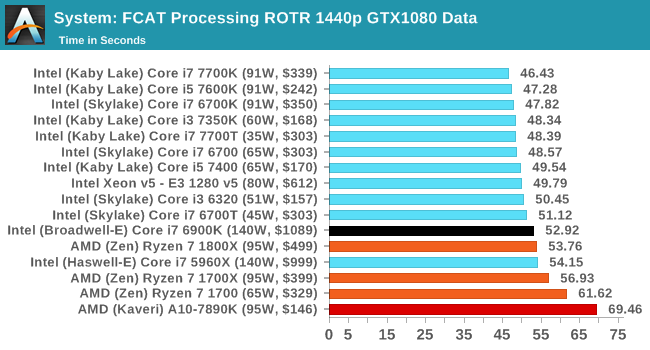
3D Particle Movement v2.1
This is the latest version of the self-penned 3DPM benchmark. The goal of 3DPM is to simulate semi-optimized scientific algorithms taken directly from my doctorate thesis. Version 2.1 improves over 2.0 by passing the main particle structs by reference rather than by value, and decreasing the amount of double->float->double recasts the compiler was adding in. It affords a ~25% speed-up over v2.0, which means new data.
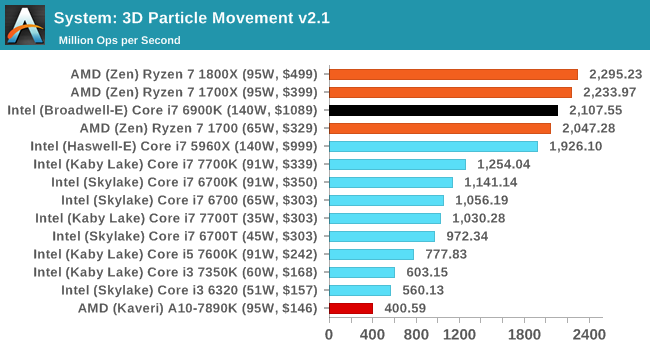
DigiCortex 1.16
Despite being a couple of years old, the DigiCortex software is a pet project for the visualization of neuron and synapse activity in the brain. The software comes with a variety of benchmark modes, and we take the small benchmark which runs a 32k neuron/1.8B synapse simulation. The results on the output are given as a fraction of whether the system can simulate in real-time, so anything above a value of one is suitable for real-time work. The benchmark offers a 'no firing synapse' mode, which in essence detects DRAM and bus speed, however we take the firing mode which adds CPU work with every firing.
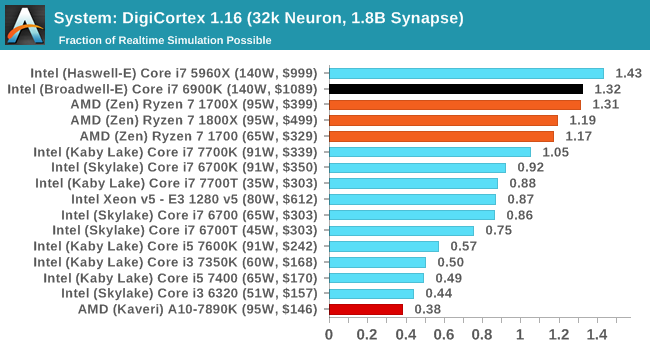
Agisoft Photoscan 1.0
Photoscan stays in our benchmark suite from the previous version, however now we are running on Windows 10 so features such as Speed Shift on the latest processors come into play. The concept of Photoscan is translating many 2D images into a 3D model - so the more detailed the images, and the more you have, the better the model. The algorithm has four stages, some single threaded and some multi-threaded, along with some cache/memory dependency in there as well. For some of the more variable threaded workload, features such as Speed Shift and XFR will be able to take advantage of CPU stalls or downtime, giving sizeable speedups on newer microarchitectures.
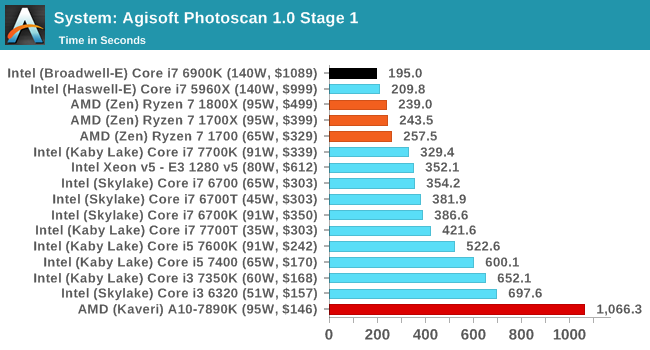
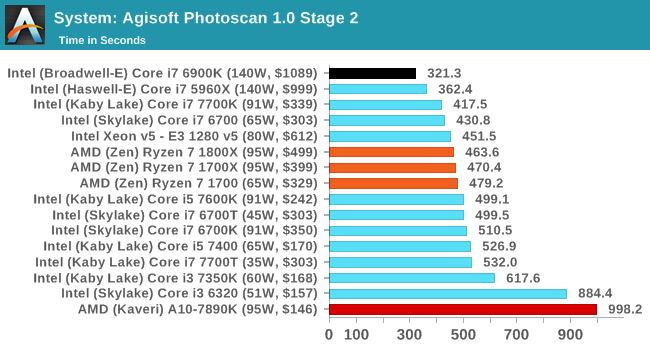
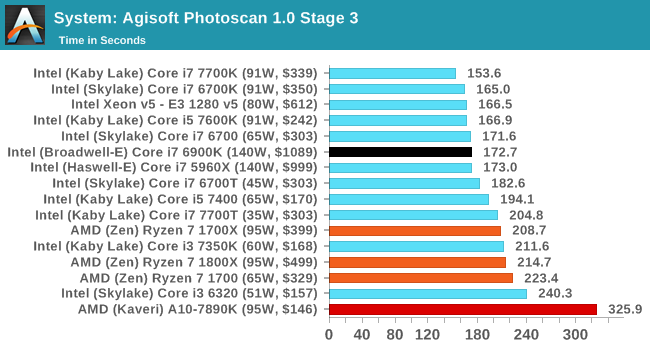
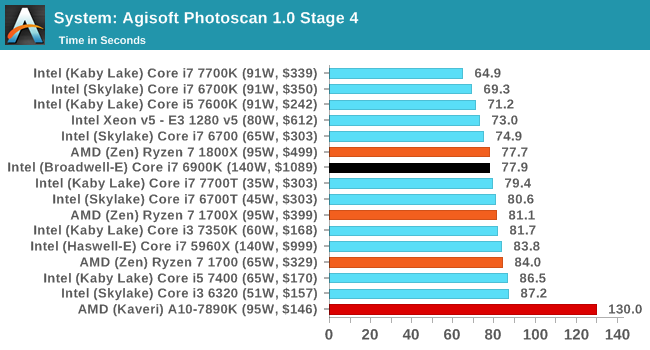
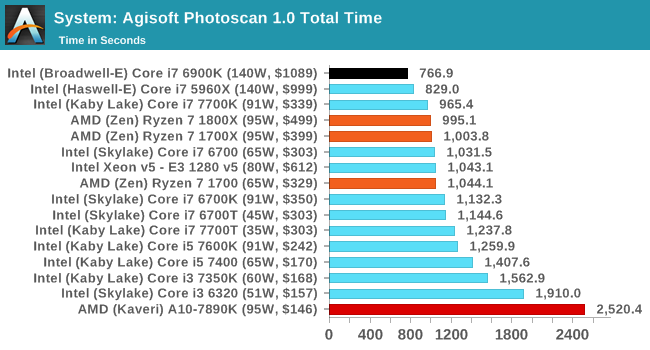










574 Comments
View All Comments
Meteor2 - Friday, March 3, 2017 - link
...In which case you'd be better off with a 7700K, looking at the benchmark results. Cheaper too.ddriver - Thursday, March 2, 2017 - link
Ryzen offers the same performance at half the cost. More pci-e lanes is good for io, however quad channel memory is pretty much pointless, aside of pointless synthetic benches. Ryzen might not make it to my personal workstation due to the low pci-e lane count, but it has enough to replace my aging 3770k farm nodes, to which it will be a significant upgrade, provided the chip and platform turn out to be stable and bug free,Intel has gotten lazy and sloppy, bricking products, chipset bugs, they haven't really done anything new architecture wise for years, milking the same old cow.
It is rather silly to assume that gaming dictates CPU prices, this IS NOT a gaming product, if your ass-logic is to be followed, the intel needs to drop the 7700k price to 168, because in games it is barely any faster than the i3-7350K, and has the same pathetic, even lower than ryzen, number of pci-e lanes.
This is a chip for HPC, which gaming is NOT. Go back to the kiddie garden, eight core chips are for grown ups ;)
imaheadcase - Thursday, March 2, 2017 - link
People compare it to gaming, because its the main driving for these type of CPUs, its not even gaming specfic but VR, Graphics modeling, etc. You honestly think people are buying these for offices or industry for complex math problems? lolddriver - Thursday, March 2, 2017 - link
It is not "people" but "fanboys", and they cling to gaming because it is the only workload where intel can offer better performance for the price, albeit by comparing products from different tiers, which is quite frankly moronic.Cars are faster than trucks, so who in the world needs to spend money on trucks? That's the kind of retarded logic you are advocating...
Smart people buy whatever suits their needs. Obviously, if all you do is play games you wouldn't be buying ryzen or a lga2011 system. Just get an unlocked i5 and overclock it, best bang for the buck. You must realize that even if you don't, other people use computers for tasks other than gaming. And for a large portion of them ryzen will be the best deal, because it is versatile - it is good enough for gaming too, while still offering significant performance advantage compare to an intel quad in tasks that are time staking, and are very much competitive with intel's 8 and 10 core chips while delivering more than twice the value, which is important for everyone who doesn't have money to throw away.
Claiming that "gaming is the main driving for these type of CPUs" is foolish to say the least, because games don't benefit from that particular type of CPUs. Most of the games can't even property utilize 4 threads. And this is not likely to change soon, because the overhead of complexity and thread synchronization is not worth it for non-performance demanding tasks such as games.
Lord-Bryan - Thursday, March 2, 2017 - link
That's one really well thought out argumentrarson - Thursday, March 2, 2017 - link
Ryzen's versatility and price are the two biggest factors that make it so good. It might not beat the very best gaming CPU that Intel has, or the very best multi-threaded monster that Intel has in every scenario, but it's competitive with both at half the price of the high-end stuff. Hence, while I do game some and want to build a computer to use for gaming, I also do other stuff like audio production that benefits greatly from Ryzen's multi-threaded performance. To me, it's a no-brainer: Ryzen right now is the best bang-for-the-buck chip for someone who wants all-around high-end performance, by far. Maybe not the 1800X, I kind of think the 1700X is a better value, but still, for most people who want multiple-use performance instead of absolute maximum gaming performance, Ryzen is the clear choice.Ryzen's max clock speeds seem, like Intel's, to be hindered by the total number of cores on chip, so it should be extremely interesting to see how the 4- and 6-core chips overclock once they arrive, and what kind of performance they'll achieve. I actually think that, like Intel, a 4-core Ryzen might be a better gaming chip than the 8-core, and if that's the case, then it might be really darn close to Intel's best Kaby Lake, because like you pointed out, most games aren't threaded well at all.
Additionally, from a gaming perspective, it seems like AMD has done more to push technology forward in that respect than anyone else. They've worked on Mantle, Vulkan, FreeSync, TrueAudio, and others. They've always tried to give performance value by offering more cores, but software has been slow to take advantage of them. Intel is content to stagnate by offering extremely incremental increases because performance is "good enough" so developers have no reason to really try to take advantage of extra cores aside from outside use cases. With Ryzen, AMD is pushing chips towards higher core counts (much like they did with the Athlon X2) but this time, they're trying harder to get developers on board and help them achieve good results. So while it always takes forever for software to better utilize the hardware, once the hardware becomes more common the software will start to follow and you'll see the actual gaming performance improve. Is that a valid reason to buy Ryzen today if your sole focus is gaming? Of course not, but it does bode well for Ryzen owners in the future. The performance can only get better. Can the same be said about Intel? Well, probably not if you're using one of the 4-core chips. It's pretty much a known quantity.
I had high hopes for Bulldozer and Ryzen is the exact opposite of what Bulldozer was. I feel like the CPU market has been stagnant for years and now suddenly there's a reason to be excited. This makes AMD competitive again, which will be good for pricing even if you're an Intel fan. It's been a long wait, but it was worth it, this is a good product.
Notmyusualid - Friday, March 3, 2017 - link
http://www.gamersnexus.net/hwreviews/2822-amd-ryze...Makaveli - Thursday, March 2, 2017 - link
+1 ddriver you destroyed that kid with your logic well done.khanikun - Friday, March 3, 2017 - link
Gaming definitely isn't the main driving force for CPUs, as use case changes. I bought a 7700K for my gaming rig. I'd get a 1700 for a VM host, as I'd like to start building a lab again. It won't be this round though. I'd rather wait for AMD to iron our any kinks and buy the next generation. It's something the 7700K could do, but more cores would definitely make it a much better lab.Meteor2 - Friday, March 3, 2017 - link
Nobody buys mid/high-end consumer chips for HPC. They buy them for gaming. A few for video production. That's it.